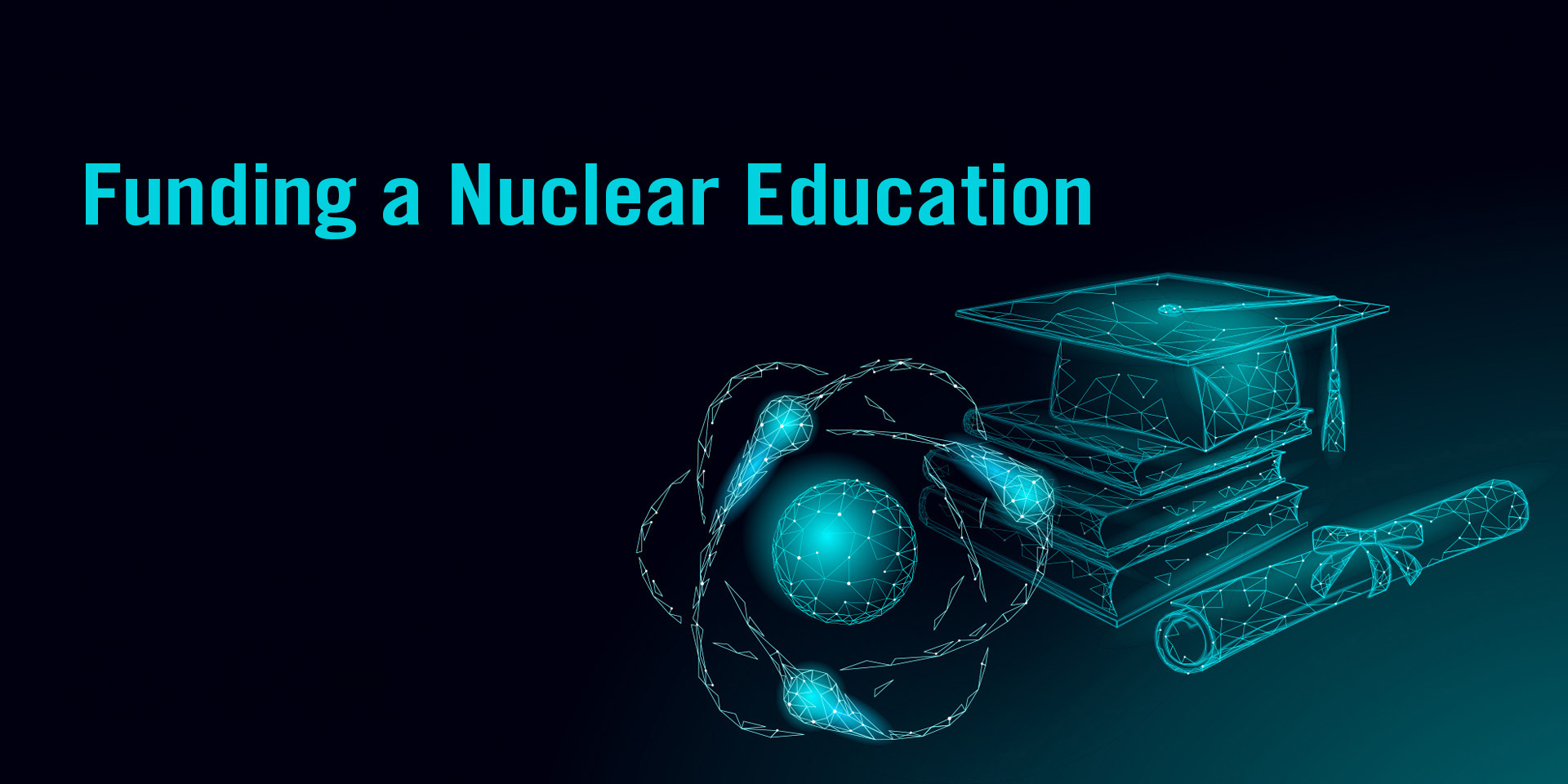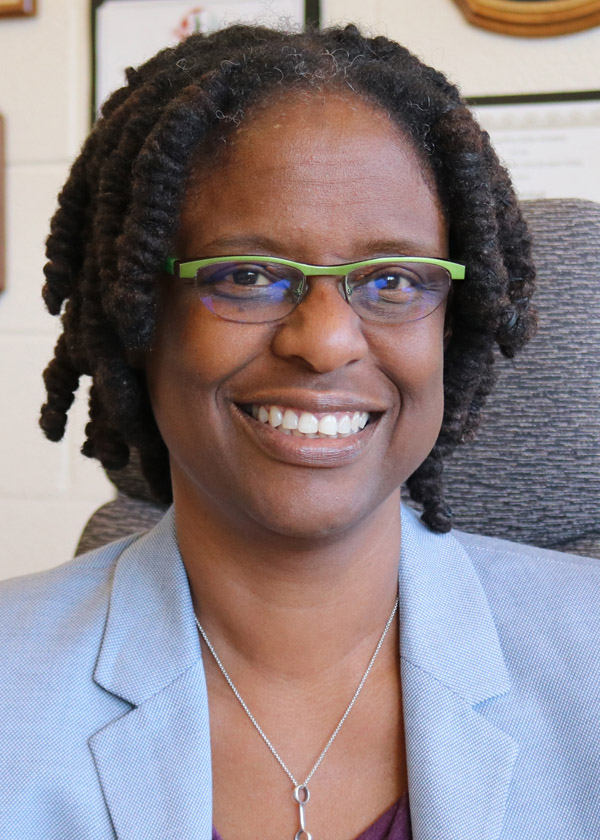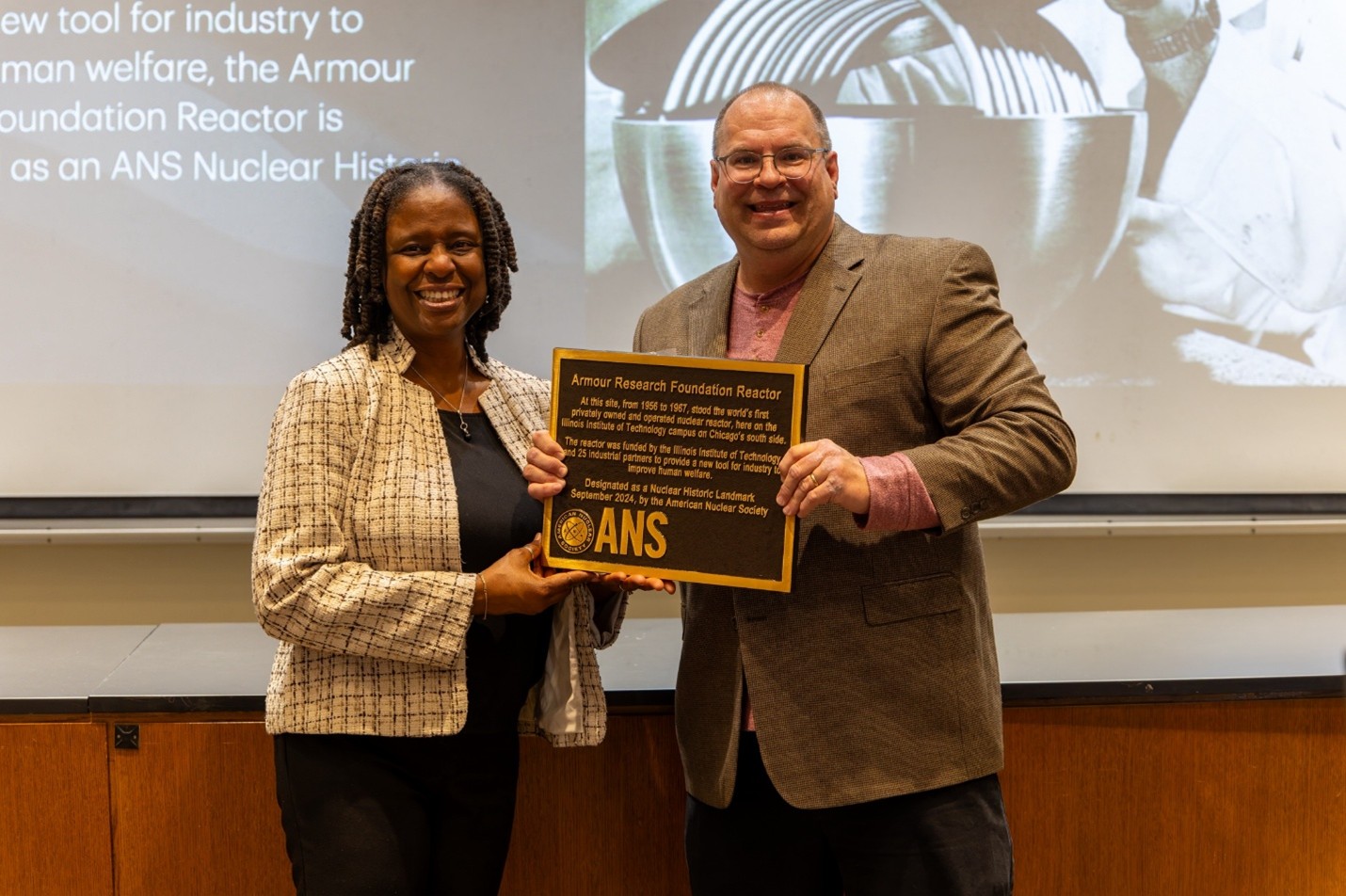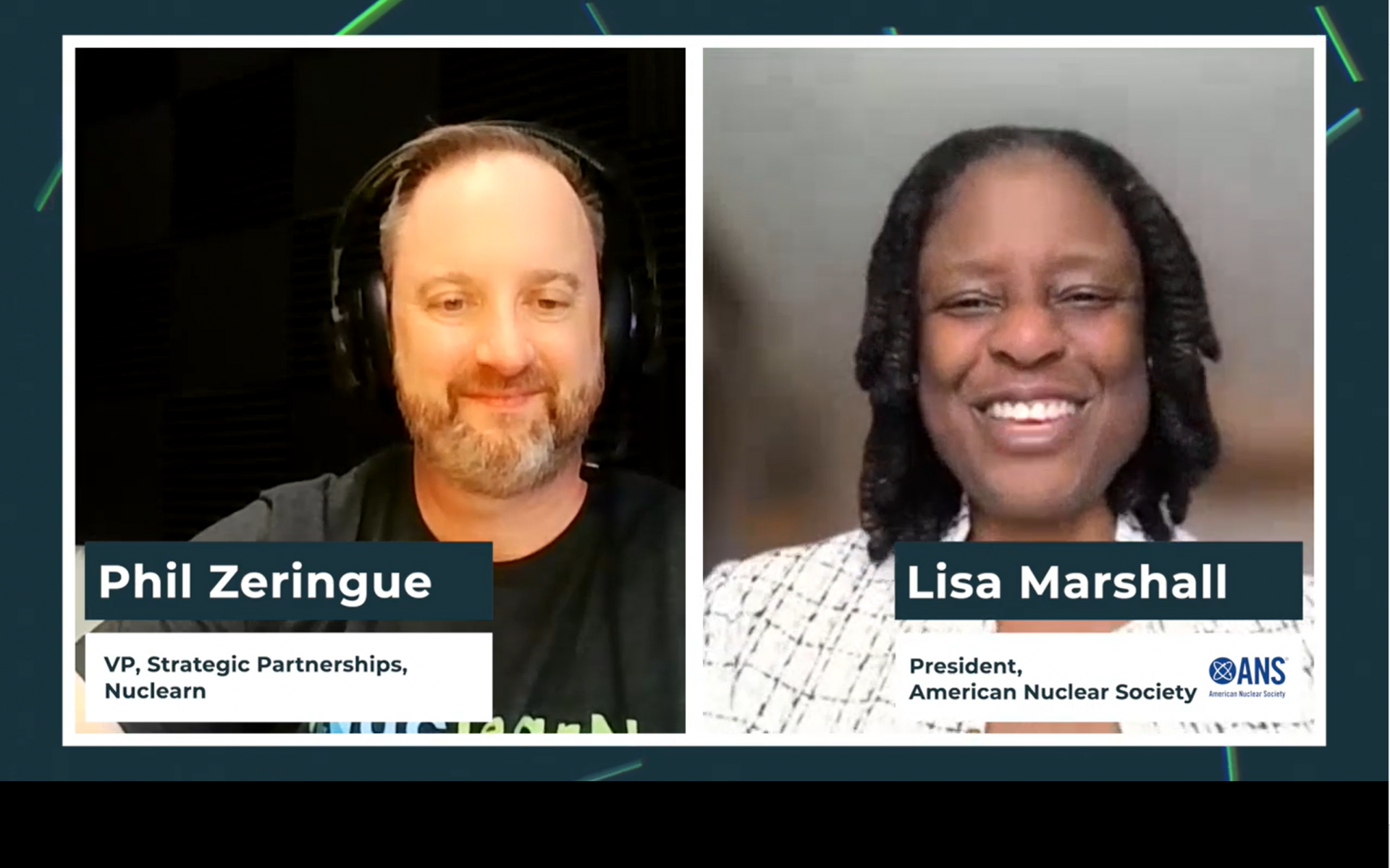ANS's webinar on finding funding for education

The American Nuclear Society’s ANS Cares Committee recently hosted a webinar examining and exploring ways to overcome the common cost barriers to pursuing a nuclear education.

A message from NV5, Inc.
Seconds Matter: Rethinking Nuclear Facility Security for the Modern Threat Landscape

The American Nuclear Society’s ANS Cares Committee recently hosted a webinar examining and exploring ways to overcome the common cost barriers to pursuing a nuclear education.

The day before the 2025 ANS Annual Conference officially began in Chicago, the air was abuzz with the crackle of Geiger counters at Argonne National Laboratory in neighboring Lemont, Ill., where about 100 visitors from across the country attended an outreach and education event hosted by the American Nuclear Society.

Lisa Marshall
president@ans.org
“As we enter the 21st century, the status of the U.S. nuclear energy industry is in flux, dependent on actions by industry, government, circumstance . . . and public opinion. Its renewal coincides with several initiatives taken by government and capitalized in particular ways by energy organizations, be they utilities, engineering firms, professional societies, educational institutions, national laboratories, trade organizations, and/or research and regulatory governmental branches . . . Nuclear fission has unleashed upon society benefits and cautionary tales that are currently being privately and publicly debated.”
These words, which I wrote almost a decade ago as part of my master’s thesis, are as true today as they were then. I have a long-standing relationship with the nuclear energy landscape. And so, as I reflect on my journey to and as your ANS president, there are some truths that have stood the test of time, serving as signposts that must remain in sight for the nuclear community:
One of the privileges of being president of the American Nuclear Society is awarding Presidential Citations to individuals who have demonstrated outstanding effort in some manner for the benefit of ANS or the nuclear community at large. Citations are conferred twice each year, at the Annual and Winter Meetings.
ANS President Lisa Marshall has named this season’s recipients, who will receive recognition at the upcoming Annual Conference in Chicago during the Special Session on Tuesday, June 17.

Lisa Marshall
president@ans.org
There is much I could have written about for this month’s issue of Nuclear News, and I have decided to reflect on conversations with our greatest asset: students. When we consider what the industry needs, I think about what students need to thrive. The educational ecosystem requires both enthusiasm and resources in and out of the classroom.
To attract and retain students, we must pay attention to cocurricular programming. Scholarships, fellowships, travel grants, internships, and co-ops—as well as our time and efforts—make a difference. Whether at schools, meetups and student conferences, or national and international meetings, we must continue to pour into our students at all levels. We also need to create an environment that pays attention to external factors that impact academic performance. This lift is a mightier one but just as important.

The American Nuclear Society presented the Illinois Institute of Technology with a plaque last week to officially designate the Armour Research Foundation Reactor a Nuclear Historic Landmark, following the Society’s decision to confer the status onto the reactor in September 2024.

ANS President Lisa Marshall recently sat down with Phil Zeringue, vice president of strategic partnerships at Nuclearn.ai to talk about the evolving state of education in the nuclear world.

The 50th anniversary of the founding of the Latin American Section of the American Nuclear Society is today: April 14, 2025! LAS/ANS was created with the goal of representing the interests of the nuclear professionals of Latin America.

Lisa Marshall
president@ans.org
Global partnerships advance the nuclear enterprise, demonstrating commitment to energy security, supply chain buildout, and economic and human development. Collaborations remain imperative, keeping these things in mind:
Approximately half of the 400-GW reactor fleet will be retiring by 2040.1
The forecasted need for new nuclear is 300–600 GW by 2050.
There is a need to counter the build-own-operate model.2
Appropriate funding and financing mechanisms are needed.
Host country regulatory oversight is paramount.
By 2050, there will be 4 million nuclear professionals supporting the industry.3
The American Nuclear Society’s online programs continue to provide informative content for the wider nuclear community. Two recent webinars held at the end of January focused on intentional outreach activities and K-12 education: “Equitable Outreach: Now Comes the Hard Part” and “Quest for Gold: Exploring Nuclear Transmutation.”

Lisa Marshall
president@ans.org
This year's ANS Conference on Nuclear Training and Education (CONTE), held in early February, tackled emerging approaches to nuclear skills and the workforce. How do we attract, retain, and qualify our future professionals? What technologies will enhance teaching and assessment methods?
In 2024, the Department of Energy called the following developments “wins for nuclear energy”:

Lisa Marshall
president@ans.org
As I watched the coverage of former U.S. president Jimmy Carter’s earthly farewell, I reflected on being too young to remember his presidency yet being impacted many years later. A man of service, Carter had a connection to the nuclear field, and his experiences shaped his decisions and our enterprise.
Carter was admitted into the U.S. Naval Academy in 1943 and successfully graduated in the top 10 percent of his class. He was chosen by Admiral Rickover, after the legendary two-hour rite of passage interview, to be a naval submariner.
In December 1952, an experimental nuclear reactor in Chalk River, Ontario, experienced mechanical problems compounded by operator error that damaged the reactor core. Carter was part of the team that helped in the cleanup and repair operation.

Lis Marshall
president@ans.org
Six months into my ANS presidency, the pace has been hectic yet good. I’ve taken nearly two dozen trips to student and local chapters; companies; and various regional, national, and international meetings, where I’ve spoken about the current and future path of nuclear: people-centered interactions that focus on the benefits and capacities of our technologies.
Perception, timing, and financing remain challenges. Perception can be addressed in our deeds, so I am heartened by continuing industry collaborations and subsequent communication to strengthen efforts in the arenas of energy security, environmental stewardship, and (inter)national leadership as we assist new-to-nuclear nations; leverage our outreach, educational, and policy instruments; and volunteer our expertise.
In November, I joined ANS’s delegation to COP29 Baku, Azerbaijan, where we strove be the voice of the nuclear community. Our presence at this and future Conferences of the Parties is necessary if we are to continue the momentum around nuclear science and technology.

Lisa Marshall
president@ans.org
Several questions loom after federal and state elections: What does the future hold for nuclear science and technology? Will there be a shift in direction? How do we continue and expand our impact on energy and nonenergy initiatives? The American Nuclear Society is an organization of people, policies, and products. We innovate, educate, and facilitate collaboration. We advance the field, serving our members and engaging with communities. With every travel assignment, I have witnessed the collective passion and action of our members toward fuller participation and societal enhancement based on nuclear technology. The work is not done, but there is forward momentum.
We have never been a field that does not answer the call, and at this year’s Winter Conference and Expo, we explored the very apt theme “Now comes the hard part.”
Among the plenaries and technical sessions were panels about engaging and educating the next generation of nuclear professionals, the growth of nuclear engineering departments in higher education, a student design competition, and—as one might expect in November during an election year—keeping nuclear out of the political fray.

Lisa Marshall
president@ans.org
October 11, 2024, marked the 70th anniversary of the American Nuclear Society. Taking a long view, we have not looked back and instead have tackled challenges and moved forward with lessons learned. Whether we pull examples from energy or nonenergy aspects of our nuclear enterprise, our planet has benefited from nuclear science and technology, and ANS has been there every step of the way.
As the Society reflects on its own history, let us remember:

Lisa Marshall
president@ans.org
My current position affords me the opportunity to travel across the nation and world, engaging with people and organizations. I am deliberately using the word engagement to stress the long-term relationship aspect of our endeavors. It is an opportunity to listen—not to respond, but to understand. It is also an opportunity to foster a collaborative connection where comfort in posing questions and developing solutions are achieved.
Pulling from engagement in the higher education literature:
Historically, in a different societal context, higher education reached out to communities in an expert model of knowledge delivery. That connection with communities has transitioned over the years to a more engaged model in which community and university partners cocreate solutions. This occurs at local, national, and global levels. Today and in the future, public universities need to build on their experience of university–community relationships and transition to making engagement more central to the core of the institution. Through such progress, higher education can continue to contribute fully to the advancement of the United States as a stronger, wealthier, and more equitable country.1

Lisa Marshall
president@ans.org
Energy is the foundation of modern society. It enhances quality of life and drives industrialization. As we work toward fuller energy transition, policies are essential to organizing our march forward. Bipartisan legislation is doing just that, propelling our current and future actions.
The Accelerating Deployment of Versatile, Advanced Nuclear for Clean Energy (ADVANCE) Act will help propel the work of industry, academia, and several branches of government in exciting—and necessary—directions.
The Senate introduced the act in March 2023, and the House of Representatives passed the Fire Grants and Safety Act, which incorporated the ADVANCE Act, on May 9, 2024 (393–13). Then on June 18, the Senate passed the ADVANCE Act (88–2), and on July 9, President Biden signed the bill into law. New and revised approaches to process and deployment of nuclear energy capacity is well on its way. Below, I have highlighted a few title sections to show scope and significance.

Lisa Marshall
2024-2025 ANS President
The importance of an education was instilled in Lisa Marshall at a young age by her grandmother. Born in Trinidad, Marshall was raised by her grandparents after her parents emigrated to Canada in pursuit of their educational goals. “My grandmother, Winifred, saw education as the route to the next level,” Marshall said, adding that the family wasn’t even sure if her grandmother had finished elementary school. “She wanted more for us than she had, and she believed the best way to achieve that was through an education.”
When Marshall was young, Winifred walked with her on the road from their house to school every day and was there to greet her when the school day was done. When Marshall was older, she went home for lunch, which her grandmother prepared. “She was a stabilizing force in my life,” Marshall said. “She kept me safe and nourished me. She taught me to be independent. And she always stressed the education part.”

Lisa Marshall
president@ans.org
Thank you for the opportunity to serve as your American Nuclear Society president. The support from within the Society, academia, professional organizations, and international partners has been heartwarming. Students have expressed joy about what the future holds, and they are ready, as am I, to be part of keeping the industry moving forward.
The year 2001 was pivotal for me; it represented my start in nuclear engineering. My career has centered around precollege and university students. To be cliché, they are our future, and we must continue to support their maturation in the field and in ANS. My cup is full when students thrive, and the Society has made many gains in this arena. We have a robust K-12 STEM program that continues to be refined, and partners among educators and organizations that strengthen the routes into the discipline.

Ken Petersen
president@ans.org
Big news as I write this, my last column as ANS president: Legislation has been passed that will ban the importation of uranium from Russia (though waivers can be used in certain circumstances to continue imports through 2027). This ban has been discussed since the Russian invasion of Ukraine. I am sure all U.S. utilities have followed their risk-management policies.
With two years to plan, appropriate-use waivers, and access to American Assured Fuel Supply, there should not be any disruption to domestic reactor operations. The ban will force the United States and our Western allies to be independent and stronger. Congress has helped by providing $2.72 billion to support new domestic enrichment capacity. The challenge now is for the Department of Energy to turn this into actual new capacity as quickly as possible.